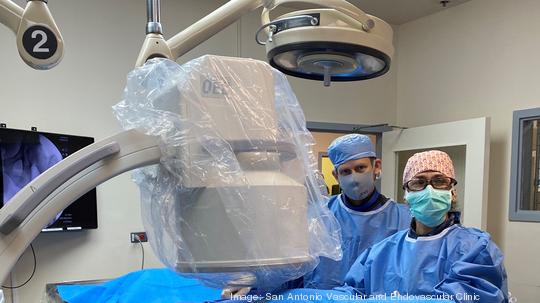
A San Antonio clinic is in a new medical trial could help narrow the disparity in access to treatment in San Antonio among those facing peripheral arterial disease.
The disease, known as PAD, creates blockages in blood vessels transporting blood from the heart to the leg. Diabetes is a main cause, and other diseases like dyslipidemia and hypertension can heighten its risk, as well as factors like smoking, high blood cholesterol and genetics.
The new trial, dubbed LIFE-BTK and spearheaded by Illinois-based global health care company Abbott, explores a new treatment for patients with the disease who often need invasive vascular surgery. In the LIFE-BTK trial, an absorbable scaffold called "Esprit" — similar to a stent — is inserted in blocked or narrowed blood vessels. It contains an agent that, when released in the blood vessel, prevents the inflammation of the blood vessel.
Dr. Lyssa Ochoa is a surgeon and founder of San Antonio Vascular and Endovascular Clinic, the local clinic participating in the new trial. Ochoa moved to San Antonio in 2011 from the Rio Grande Valley and worked for a large private vascular surgery group before opening her own clinic.
"One of the things that was really eye opening to me is what we know — diabetic complications like amputations, heart attacks, strokes, kidney failure — these are avoidable. I was seeing this in young patients in their 30s," she said.
Ochoa said this is in part due to the racial and economic segregation of San Antonio.
San Antonio Area Asset Funders Network, a regional chapter of grantmakers who invest in opportunities for low- and middle-income individuals and families, and Texas Appleseed, a nonprofit that helps promote social, economic, and racial justice, conducted a study in 2019 that indicated one in seven Bexar County residents has diabetes. Poorer zip codes with large numbers of Black and Hispanic residents have numbers as high as one in five. Black, Hispanic and indigenous people are at heightened genetic risk of type-2 diabetes, Ochoa said. They often face financial barriers to treatment, leading to preventable late-stage interventions like amputation.
Her aim with her clinic is to provide easier access to treatment for patients needing vascular care. Today, her clinic operates in seven locations on the south side and west side of San Antonio and a seventh clinic is scheduled to open in March on the east side. The clinic serves all patients, with or without insurance, offering assistance through a health insurance coordinator to help patients who need vascular care apply for resources like Medicaid.
Now, patients visiting the clinic can apply to be part of the LIFE-BTK trial.
"My ultimate hope for the ... trial is that we’re able to enroll enough patients ... (to get) quality data," Ochoa said. ... "Maybe we can really move the needle in preventing diabetic amputations long-term."



